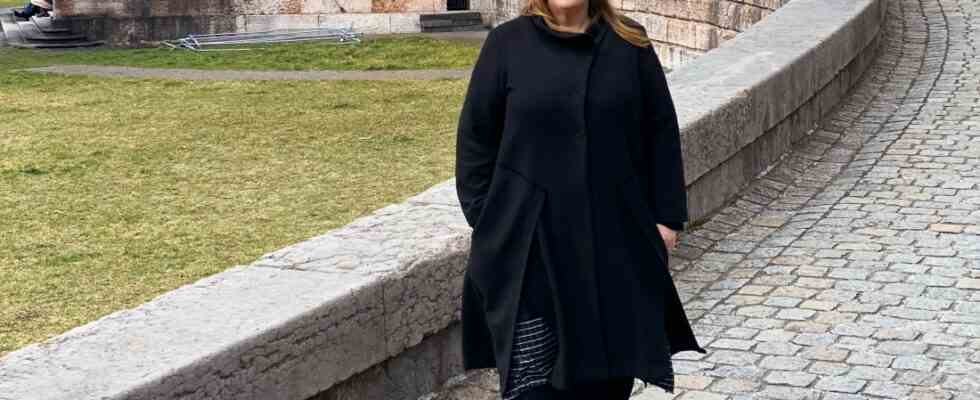“We need art,” Karen Pontoppidan is convinced of. And art needs an academy like the one in Munich. The self-confident Dane has set out to defend this institution of freedom against all standardizing challenges. She is the first female president of the Academy of Fine Arts in Munich, which has existed since 1808. She was asked, she was ready and was elected – unopposed. No wonder, given their ardent commitment to the master classes, which guarantee individual support, and to the workshops, which enable experiments with almost every conceivable material.
The jewelery artist herself has benefited from the oldest training system in Europe, which originated from the craft apprenticeship, and has become a successful professional. Even as a 13-year-old, Karen Pontoppidan only wanted one thing: to make jewellery. Her parents’ farm on a small Danish island was too small for her. After her parents were also politically active and took over offices, the teenager felt that she was being watched too much. At 17 she left the court to do an apprenticeship as a goldsmith. She left Denmark to study at the Vocational College for Design, Jewelery and Appliances in Schwäbisch Gmünd. But the craftsmanship was not enough for her. She wanted to be an artist, to be free, free from conventions and assigned roles. In 1991 she was accepted into the Jewelry and Utensils class at the Academy. She studied there with Otto Künzli for six years, then was his assistant for another six years and thus grew into the apprenticeship.
A call to the famous Stockholm Ädellab (noble laboratory) followed. After a good nine years, the professor returned to Munich. Since 2015 she has been leading the class for jewelry and utensils. It is by far the most colorful class in the academy. The students come not only from Europe, but also from Asia and South America. For the students from Munich, Nuremberg or Weimar, being foreign is also the starting point for artistic reflection. Communicating in a foreign language about one’s own cultural background trains the young artists’ communication skills, without which they would have no chance as professionals. Listening makes certainties disappear and inspires new stories and new images.
“Class is my passion,” says Karen Pontoppidan. As President of the Academy, she will continue to take care of her class. She discussed the new distribution of roles between politics and teaching with her students in a spirit of trust. Your position allows for a reappointment to the Jewelry and Device class. The area of equipment, which has been neglected for a long time, is to be strengthened in a targeted manner. Karen Pontoppidan has already named her representative, an internationally renowned silversmith – all that’s missing is the signature on the contract.
More equal opportunities with the master class system
The jewelry artist is a little proud that she has achieved the unthinkable, as a foreigner and as a woman. She emphasizes that it is not being a woman who recommends her for the presidency, but the qualities she had to develop in order to be successful as a woman in society. As a citizen and artist, Karen Pontoppidan has grappled intensively with gender issues, ethnicity, class differences, and hierarchies. As a teacher, she has learned to critically question her own position. She knows the academy’s masterclass system is prone to abuse of power and trust, which is why it’s been scrapped at other colleges. Nevertheless, she vehemently defends this system because it offers more equal opportunities and more freedom than any other higher education system.
The Academy of Fine Arts in Munich accepts people with special talents who often do not fit into any system. Students at the academy are already artists when they are accepted. You don’t have to have a high school diploma. Individual support in small classes enables students to be successful in their profession. This also includes the ability to articulate oneself in public. There are few compulsory courses. Each and every student has the freedom to acquire the knowledge and skills at the moment when they become necessary for their own artistic development. Independent learning and the associated time management are the basis for professionalization. 19 different workshops with highly qualified workshop leaders support the students when they are looking for the right material and technology for their ideas and projects.
“Art lives from being loud.”
As President, Karen Pontoppidan will be an ambassador for all artists. It will not turn the academy system upside down, but rather help to further develop its strengths. Her concern is to improve communication both internally and externally. “So far we haven’t presented ourselves as well as we are.” Above all, she wants to stimulate open discussions about the status of art in society. On the one hand art is valued, but on the other hand it is not given enough space to develop. Art likes to be treated “like a child who should stand in the corner well dressed. But art thrives on being loud,” affirms the artist. In her office, Pontoppidan wants to emphasize how important art is for reflection in a free society.
For this office, she refrains from curating and publishing exhibitions. But she will continue to be artistically active. As an advocate for the freedom of art, Karen Pontoppidan will also wear author’s jewelery for the first time in public appearances. So far, they have only been known to be undecorated, completely wrapped in black. Anyone who meets the President of the Academy in the future should therefore pay attention to the messages that she conveys non-verbally to the public.

